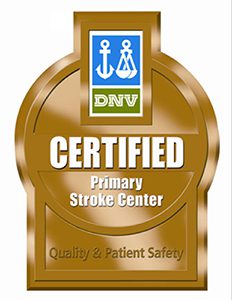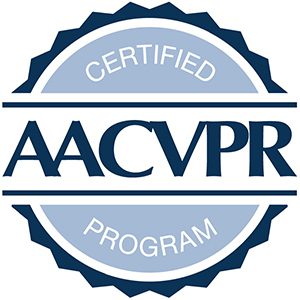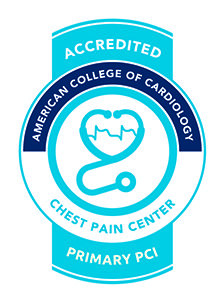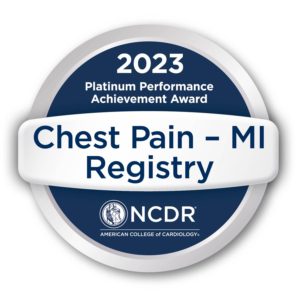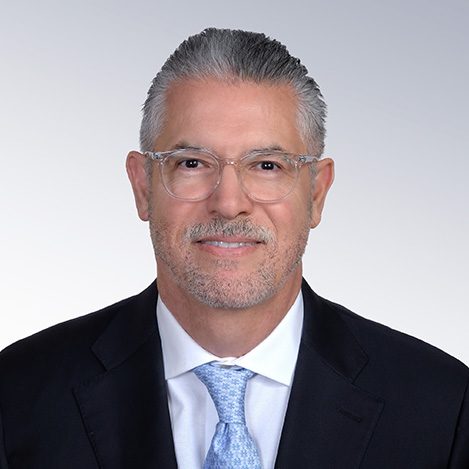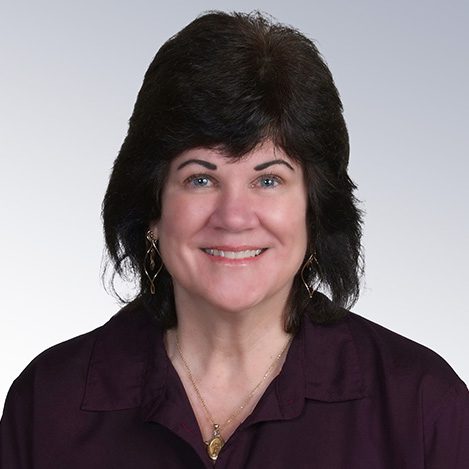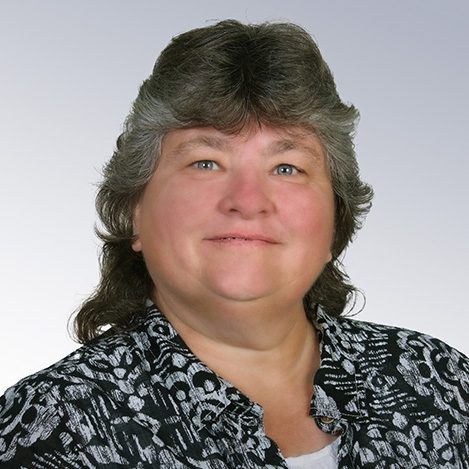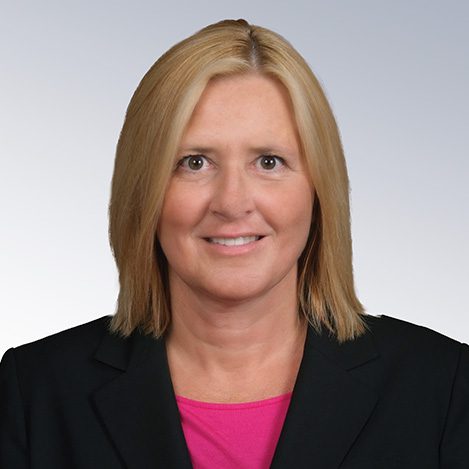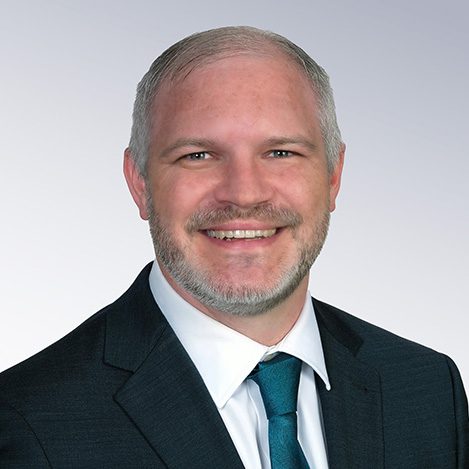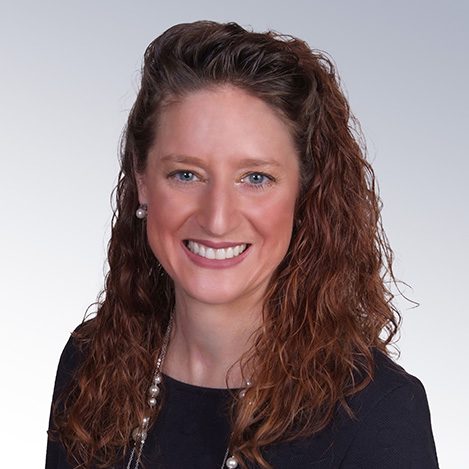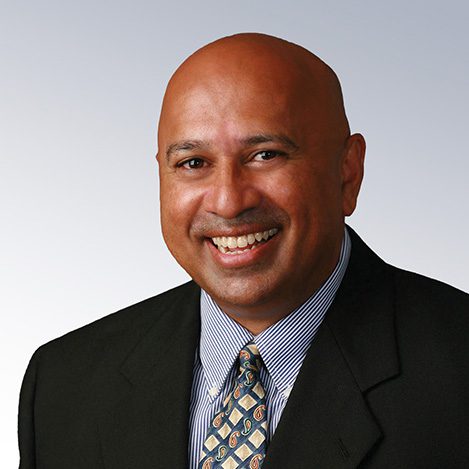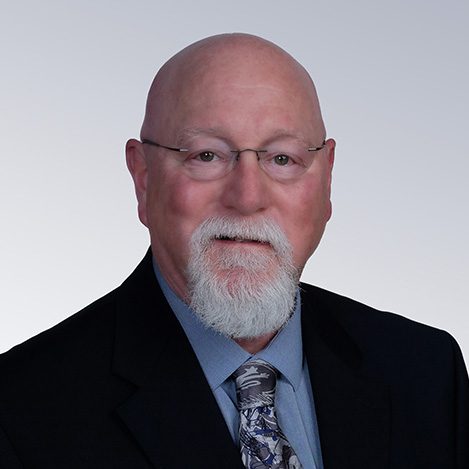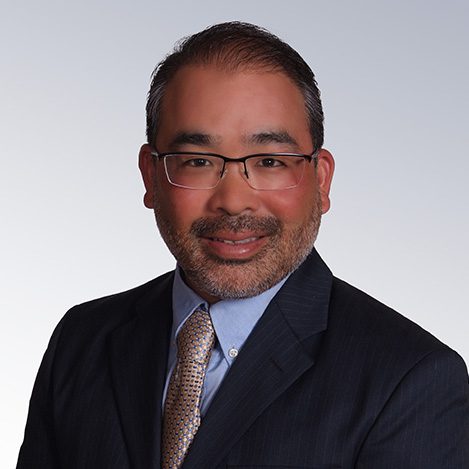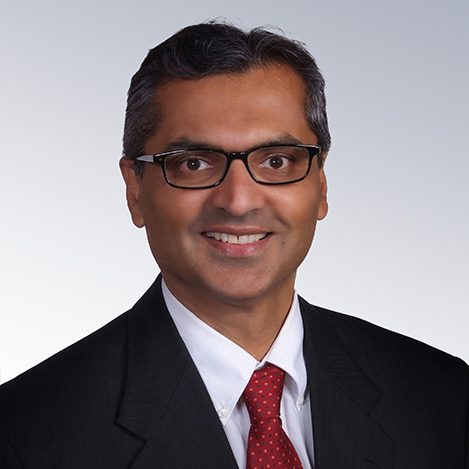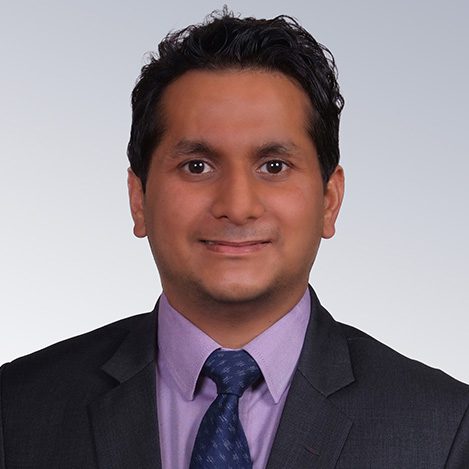The region’s most advanced and comprehensive cardiac care, with dedicated specialists and state-of-the-art technology - because your heart comes first at HaysMed.

Your Heart Leads the Way at HaysMed
In the DeBakey Heart Institute at HaysMed, we take everything about your cardiac care to heart. That’s why we provide the region’s most advanced, comprehensive and specialized heart care. With numerous outreach clinics across western Kansas, everyone has access to our dedicated specialists and state-of-the-art technology – ensuring the care you need, when and where you need it.
Collaborative Care
Our cardiologists and cardiac surgeons collaborate closely with your primary care team to deliver seamless cardiac care where you live, work and play. From screenings to emergency care, surgery, cardiac rehabilitation and more, we provide specialized expertise you can count on – so you can keep your heart close to home. See our full list of services here.
Accreditations for Excellence
Our Chest Pain Center is the only accredited Chest Pain Center in western Kansas, providing superior emergency and cardiac care. HaysMed is also the first hospital in Kansas to be certified as a Primary Stroke Center hospital by DNV Healthcare, recognizing our dedication to the latest and most rapid care possible for stroke victims.
Admissions and Referrals
Referrals may be initiated by your primary care physician or another allied health professional. Our cardiology team is committed to including referring physicians in the decision-making process and keeping them updated on your status. We strive to return patients promptly to their local community hospitals and health care providers for ongoing care. We also accept self-referrals.
For exceptional patient care, experiences and outcomes, your heart leads the way at HaysMed.
To make an appointment, call 785-625-4699.
For more information about heart health, visit our Health Library.
Chronic Care Management
HaysMed offers ChartSpan, a care management program designed to offer exceptional support for eligible Medicare patients. Developed in partnership with the Centers of Medicare/Medicaid, ChartSpan provides round-the-clock access to a team of medical professionals, ensuring our eligible patients receive the necessary support to maintain their health and avoid unnecessary emergency room visits.
Learn more about the ChartSpan program. If you are interested in enrolling, please contact your provider.
Comprehensive Cardiology Services
There’s no need to drive hours from your home for top-flight heart care – either for life-saving emergencies, or for the life-affirming care that follows. Our full-service heart program was developed under the guiding hand of the “father of heart surgery” Dr. Michael DeBakey.
We are proud to be an accredited Chest Pain Center and designated as a Primary Stroke Center, making us the leader in our western Kansas region for heart attack and stroke care. But that’s just the tip of the iceberg when it comes to the depth and breadth of our expertise. Our program includes the following services for diagnosing, treating and monitoring your heart condition:
Clinical Consultation
- General Cardiology
- Preventive Cardiology
- Heart Failure Clinic
- Arrhythmia Clinic
Non-Invasive Diagnostic Testing
- Electrocardiogram
- Cardiac Rhythm Monitoring
- Transthoracic Echocardiography
- Transesophageal Echocardiography
- Exercise Stress Test
- Exercise or Dobutamine Stress Echocardiography
- Exercise or Pharmacologic Myocardial Perfusion Study
Interventional Cardiology
- Diagnostic Coronary Angiography
- Right or Left Heart Catheterization
- Coronary and Peripheral Intravascular Ultrasound Imaging
- Coronary Fractional Flow Reserve
- Coronary Angioplasty
- Coronary Stenting (bare metal and drug eluting)
- Coronary Thrombectomy
- Rotational Coronary Atherectomy
- Percutaneous Pericardial Drainage
- Percutaneous Mechanical Hemodynamic Support
- ASD and PFO Closure
Endovascular Therapies
- Peripheral Angioplasty and Stenting
- Drug Eluting Balloon Peripheral Atherectomy
- Critical Limb Ischemia
- Intravascular Thrombolysis
- Inferior Vena Cava Filter
Heart Rhythm Disorders
- Complex ablation procedures for conditions such as atrial fibrillation, supraventricular tachycardia and ventricular tachycardia
- Surgical techniques and technologies for pacemakers and defibrillators
- Complex lead extraction procedures
- Atrial fibrillation
Surgery
Electrophysiology/Cardiac Ablation
Electrophysiologists specialize in the heart’s electrical functions and rhythms. One common condition they treat is cardiac arrhythmia, in which the heart beats with an irregular or abnormal rhythm. While some arrhythmias are harmless, others such as atrial fibrillation (AFib) can be life threatening. Cardiac ablation is a non-surgical treatment for AFib in which your HaysMed electrophysiologist uses energy or extreme cold to destroy the cells that cause abnormal electrical signals causing cardiac arrhythmia. Tissue treated with cardiac ablation helps get your heartbeat regular again.
Electrophysiology services include:
- Implantable Loop Recorder
- Pacemaker Clinic with remote device surveillance
- Permanent Pacemaker Implant
- Automatic Cardioverter Defibrillator Implant
- Subcutaneous Automatic Cardioverter Defibrillator
- Cardiac Resynchronization Device Implant
Cardiac Stents/Catheterization
Cardiac stents are tube-shaped devices that offer a means for opening up blockage in heart arteries without requiring surgery. Cardiac stents are shown to reduce chest pain and improve survivability. In our cardiac catheterization labs, our HaysMed cardiologists use angiography to assess the location and size of arterial blockages. Using balloon cardiac catheterization, the stent is placed in the proper location and expanded to the artery’s original diameter, thus improving blood flow.
For exceptional patient care, experiences and outcomes, your heart leads the way at HaysMed. To make an appointment, call 785-625-4699.
Expert Diagnosis and Treatment for Chest Pain
The DeBakey Heart Institute at HaysMed is the only accredited Chest Pain Center in western Kansas. To become an accredited Chest Pain Center, our ability to assess, diagnose and treat patients who could be experiencing a heart attack was rigorously evaluated by the Society of Cardiovascular Patient Care (SCPC). If you or a loved one experience chest pain or other early warning signs of heart attack, your best care is available at HaysMed.
Our team of cardiac specialists is available 24/7 to provide the care you need – when and where you need it. We work with the emergency team to begin heart care treatment while you are still en route to the hospital.
Our cardiologists and cardiac care teams have been specially trained to save precious minutes when every second counts in the race to stop – and in many cases, even reverse – the damage caused by a heart attack. Fast, expert action, combined with our thorough follow-up care, means you may return to your full, active life within days instead of weeks or months.
In the event of chest pain, do not drive to the hospital or let someone else drive you. Call an ambulance so that trained medical personnel can begin life-saving treatment on the way to the emergency room.
Know the Warning Signs of Heart Attack
To help you determine if you or a loved one may be experiencing a heart attack, more information is available below. If you are unsure, call 911 immediately for prompt evaluation and intervention as needed.
What Is a Heart Attack?
A heart attack occurs, in most cases, when a vessel supplying the heart muscle with blood and oxygen becomes completely blocked. The vessel has become narrowed by a slow buildup of fatty deposits, made mostly of cholesterol. When a clot occurs in this narrowed vessel, it completely blocks the supply of blood to the heart muscle. That part of the muscle will begin to die if the individual does not immediately seek medical attention.
Did You Know?
Heart attacks have beginnings. These “beginnings” occur in over 50 percent of patients. More importantly, if recognized in time, these “beginnings” can be treated before the heart is damaged. At least 85 percent of heart damage occurs within the first two hours of a heart attack.
There are warning signs and risk factors associated with heart attacks in men and women. View the Early Heart Attack Care (EHAC) page (link below) to learn more and don’t hesitate to call 911 in the event you or someone you are with is experiencing symptoms.
Warning Signs of a Heart Attack
Heart disease is a leading cause of death in the United States. Each year, approximately 1.2 million Americans suffer a heart attack, and nearly one-third of these individuals die, many before they reach the hospital. People often dismiss heart attack warning signs, such as chest pain, and think they merely have heartburn or a pulled muscle. The unfortunate conclusion is that many people wait too long before getting help. We want you to recognize the early symptoms of a heart attack:
- Pressure, fullness, squeezing pain in the center of the chest, spreading to the neck, shoulder or jaw
- Chest discomfort with lightheadedness, fainting, sweating, nausea, or shortness of breath
- Upper abdominal pressure or discomfort
- Lower chest discomfort
- Back pain
- Unusual fatigue
- Unusual shortness of breath
- Dizziness
- Nausea
Keep in mind that, for women, the symptoms are just as dire, but often much more subtle (and easier to ignore):
- Chest discomfort – often described as pressure rather than acute pain in women
- Discomfort in other parts of the body – one or both arms, the back, jaw, or stomach
- Shortness of breath – with or without chest discomfort
- Cold sweat, nausea, or lightheadedness
These symptoms may come and go until finally becoming constant and severe. Treatments are most effective when they occur in the early stages of chest pain.
For more information about heart health, visit our Health Library. You may also visit the American Heart Association’s website for more details about heart attack warning signs and risk factors.
For more information or to make an appointment, call 785-625-4699.
Cardiothoracic and Vascular Surgery
When you need heart surgery, you need and deserve the very best – and you will find it at HaysMed. Here, in the DeBakey Heart Institute, our cardiothoracic and vascular surgeons frequently perform the following procedures:
Cardiac Procedures
- Coronary Artery Bypass Grafting (CABG) with Endoscopic Vein Harvest
- Off-Pump Coronary Artery Bypass (OPCAB)
- Aortic Valve Replacement
- Mitral Valve Repair and Replacement
- Intracardiac Tumor Excision
- Pericardiectomy
Thoracic Procedures
- Thoracoscopy, Video Assisted Lung Surgery
- Thoracotomy with Lung Tumor Resection
- Mediastinal Resection of Thymic, Thyroid and Other Masses
- Talc Pleurodesis
- Decortication
Vascular Procedures
- Carotid Endarterectomy
- Peripheral Vascular Bypass Grafting and Endarterectomy
- Open Repair Abdominal Aortic Aneurysm
- Endovascular (Stent) Repair Abdominal and Thoracic Aortic Aneurysms
Post-Surgical Care
If you need cardiac surgery, our team is here to help you achieve a full recovery. Patients receive one-on-one nursing care and respiratory therapy in our intensive care unit (ICU). After your post-surgical stay in the ICU, you will move to a dedicated cardiology step-down unit to continue cardiac rehab until ready for discharge.
For more information or to make an appointment, call 785-625-4699.
For information about heart health, visit our Health Library.
Cardiac & Cardiopulmonary Rehabilitation
For many people, specialized rehabilitation services are an important part of recovering from and managing cardiac and cardiopulmonary issues. As your destination for excellence in cardiology, the DeBakey Heart Institute at HaysMed offers comprehensive, patient-centered rehabilitation programs to meet your needs.
Cardiac Rehabilitation
Cardiac rehabilitation helps reduce cardiovascular risk through a program of exercise and education. After you’ve had a heart attack or medical procedure, your doctor may recommend a cardiac rehabilitation program as part of your recovery. Cardiac rehabilitation is designed to improve muscular and cardiovascular endurance, and offers education to help reduce the risk of future heart problems.
The goal is to help you achieve your best physical, mental and social well-being through exercise and lifestyle change. It is available during your hospital stay and on an ongoing, outpatient basis.
Inpatient cardiac rehabilitation
Inpatient cardiac rehab is ordered by your doctor and begins early on in your hospital stay. It is important to begin cardiac rehab as soon as possible to help you recover. The physical therapy staff will get you up and safely moving. The patient educator will visit with you and your family to explain your condition and treatment. Exercise and education are started to reduce any concerns. You will begin with simple exercises and progress to walking and longer exercise sessions. Your blood pressure and heart rate are always watched during these sessions. Staff will teach you signs and symptoms to watch for, dos and don’ts for home and medication instruction.
Outpatient cardiac rehabilitation
Outpatient cardiac rehab is a doctor-ordered service provided to patients with heart disease. The program includes:
- Exercise to improve fitness without going over your safe limits
- Monitoring blood pressure, heart rate/rhythm and physical responses during exercise
- Updates from staff to your doctors on your progress
- Education about heart disease topics including:
- Stopping smoking
- Lowering cholesterol
- Controlling high blood pressure
- Weight loss/control
- Improving diabetes management
- Increasing physical activity
- Healthy eating habits
- Improving mental well-being
Those who benefit from outpatient cardiac rehab include those with a history of:
- Myocardial infarction (heart attack)
- Coronary artery bypass graft surgery (CABG)
- Current stable angina pectoris (heart-related pain/symptoms)
- Heart valve repair or replacement
- Percutaneous transluminal coronary angioplasty (ballooning or coronary stenting)
- Heart or heart-lung transplant
- Heart failure and those with ventricular assist devices
Pulmonary Rehabilitation
Pulmonary rehabilitation is a program for those who are suffering from mild to severe lung disease. It is provided as an outpatient service over a period of 8-36 sessions. Patients learn vital keys to living with diseases like emphysema, asthma, chronic bronchitis, chronic obstructive pulmonary disease (COPD), and recovery from lung surgeries or lung reductions. The goal is to build skills that make daily activities easier and reduce return hospital stays.The program is overseen by a medical director and includes staff trained as respiratory therapists, exercise physiologists and registered nurses.
The program begins with a review conducted by the program staff to determine what activities and education are most relevant to you and help you establish goals for the program. Each patient’s program is specific to the needs and goals of that patient. The program will include supervised exercise and education regarding topics related to lung disease.
Education topics may include any of the following:
- How the lungs work
- The COPD process
- Breathing techniques
- Supplemental oxygen
- CPAP
- Exercise basics
- Nutritional needs
- Social support
- Stress reduction/avoiding panic with breathlessness
- Bronchial hygiene
- Secretion clearance
- Medications/Inhalers/Nebulizers
- Avoiding smoking
- Environmental hazards
- Energy conservation
- Home equipment and travel
- Advanced directives
Program staff will strongly encourage continuing with an exercise routine once the pulmonary rehab program is completed. Our staff can find you appropriate activities to participate in upon graduation. Home programs are an option that the staff can help you develop. Some people prefer to continue in a more managed setting. For those who wish to continue exercising in a managed setting, the WellCare program is available through the Center for Health Improvement. The rehab staff can help you decide what will be the most beneficial setting to help maintain the progress you gain during pulmonary rehab.
For more information or to make an appointment, call 785-625-4699.
For information about heart health, visit our Health Library.
Vascular Care
The DeBakey Heart Institute’s Peripheral Arterial Disease (PAD) clinic provides expert screening, diagnosis and management of suspected or established PAD and varicose veins.
With advanced specialization in PAD, our physicians perform diagnostic and therapeutic peripheral angiograms and vascular interventions including percutaneous balloon angioplasty and stents. These patients will be seen in a special PAD clinic for a detailed comprehensive vascular assessment.
Who can benefit?
- Patients with pain in lower extremities
- Patients with non-healing wounds of lower extremities
- High-risk patients with history of diabetes and smoking with leg pain symptoms
- Patients with varicose veins
Procedures
- Diagnostic and therapeutic peripheral angiogram
- Vascular Interventions: Percutaneous balloon angioplasty and stenting
To make an appointment, call 785-625-4699.
Cardiovascular Patient Guide
Our physicians perform procedures and surgeries at HaysMed and select hospitals in surrounding areas. Our DeBakey Heart Institute team understands that the period surrounding your procedure can produce an uneasy feeling for you. To improve the experience, we provide detailed information about when to arrive and what to expect before and after each surgery or procedure. When packing your bag, whether for an outpatient or inpatient procedure, remember to bring the following:
- Any specific, individualized instructions/information provided to you by your physician
- Copies of any recent lab results or any other recent resting if you have them
- Your medications or a complete list of all prescribed and nonprescription medications that you are taking
- Loose, comfortable clothing (including shorts)
- Athletic or walking shoes
- Insurance cards
- Workers’ Compensation information
- Picture I.D.
To learn more about various procedures and phases of your treatment, visit our surgery guide page. As always, if you have questions, we are here to help and encourage you to call us at the DeBakey Heart Institute at 785-625-4699.
Cardiovascular Screening
The most common vascular diseases in the U.S. are atrial fibrillation, carotid artery disease, peripheral arterial disease and aortic aneurysms. These conditions are also the ones that produce the most potential for death and disability.
Early Detection Is Vital
In most cases, with early detection, vascular disease can be treated effectively. There are several simple screening tests that detect these problems, all of which are non-invasive and painless. The tests include:
- Atrial Fibrillation: Checks for cardiac arrhythmias (this test is only available at HaysMed)
- Peripheral Arterial Disease: Checks for your risk of having blockages in the leg arteries
- Stroke Scan: Uses the carotid ultrasound with doppler to look inside the carotid arteries to detect early signs of plaque build-up
- Aortic Aneurysm Scan: Looks for abdominal aortic aneurysm (aneurysm or ballooning of the artery wall may cause the artery to burst)
Screenings require a physician’s order. Call your provider’s office or log on to the patient portal and send a message to obtain an order. Once you have an order, call us at 785-623-6565 to schedule your screening.
Our Locations
The DeBakey Heart Institute is located on the second floor of the Bickle Family Tower at:
2220 Canterbury Drive
Hays, KS 67601
For more information or to schedule a consultation, please call 785-625-4699.
DeBakey Heart Institute Outreach Clinics
The DeBakey Heart Institute also provides specialized cardiac care at several outreach clinic locations in these Kansas communities:
Citizens Medical Center
100 E College Drive
Colby, KS 67701
Multispecialty Clinic in Dodge City
2300 N. 14th Ave, Suite 1400
Dodge City, KS 67801
Great Bend Specialty Clinic
3720 10th Street
Great Bend, KS 67530
Graham County Hospital
304 W Prout
Hill City, KS 67642
Rush County Memorial Hospital
801 Locust Street
La Crosse, KS 67548
Larned
Pawnee Valley Community Hospital
923 Carroll Avenue
Larned, KS 67550
Norton Clinic
Norton County Hospital
102 East Holme
Norton, KS 67654
The Osborne Clinic
Osborne County Memorial Hospital
237 West W Harrison Street
Osborne, KS 67473
The Plainville Clinic
Rooks County Hospital
1210 N Washington Street
Plainville, KS 67663
Phillipsburg Clinic
Phillipsburg County Hospital
1150 State Street
Phillipsburg, KS 67661
Quinter Clinic
Gove County Medical Center
520 W 5th Street
Quinter, KS 67752
Russell Clinic
Russell County Memorial Hospital
200 S Main Street
Russell, KS 67665
Scott City Clinic
Scott City County Hospital
201 Albert Avenue
Scott City, KS 67871
The Smith Center Clinic
Smith County Memorial Hospital
921 Highway 36
Smith Center, KS 66967
The Wakeeney Clinic
Trego County-Lemke Memorial Hospital
320 N 13the Street
WaKeeny, KS 67672
Providers
View AllCertified, accredited excellence
The Debakey Heart Institute at HaysMed is committed to providing safe, high-quality care. From the patient experience we deliver to the expertise of our entire team, we’ve always specialized in you.
